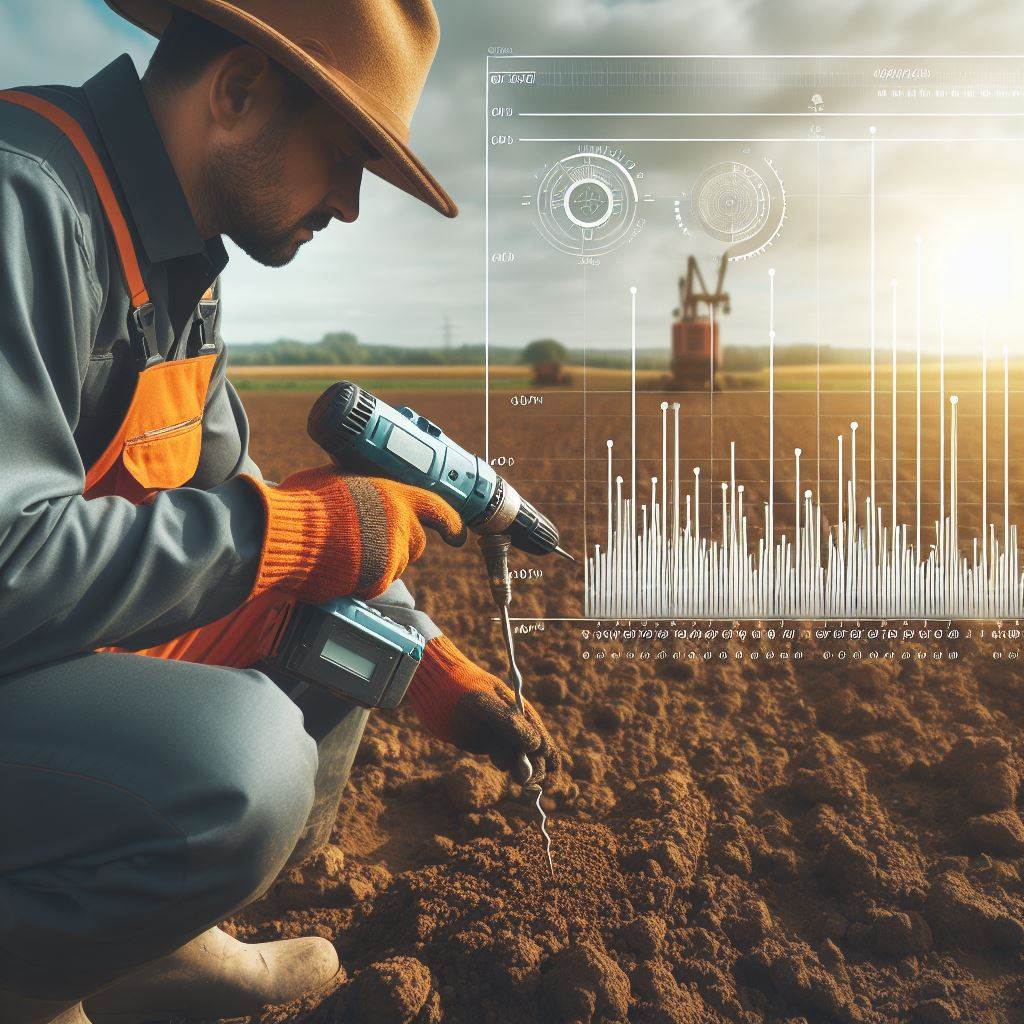Introduction
Agricultural mining engineering merges engineering principles with agricultural and mining practices.
Its relevance in Australia stems from the nation’s abundant natural resources and thriving agricultural industry.
This blog post aims to delve into the importance of agric Fultural mining engineering in Australia, highlighting its role in optimizing resource utilization, enhancing agricultural productivity, and promoting sustainable practices.
By exploring the intersection of agriculture and mining through an engineering lens, we can gain insights into innovative techniques, technologies, and strategies that contribute to the growth and resilience of Australia’s agricultural and mining sectors.
Through case studies, expert interviews, and analysis, we’ll uncover the multifaceted impacts and applications of agricultural mining engineering, ultimately illustrating its significance in driving economic development, environmental stewardship, and food security in Australia.
Agricultural mining engineering
Agricultural mining engineering combines engineering principles and practices with the agricultural and mining sectors. It focuses on finding innovative and sustainable solutions to maximize productivity and efficiency in these industries.
Agricultural mining engineering in Australia
In Australia, agricultural mining engineering plays a crucial role due to the country’s abundant natural resources and strong agricultural sector.
It aims to enhance the extraction of minerals from the earth while minimizing environmental impact.
By applying engineering techniques, it seeks to optimize agricultural practices, improve irrigation systems, and enhance crop yield.
Purpose
This blog post aims to shed light on the importance of agricultural mining engineering in Australia.
It will explore how this field contributes to the country’s economy, sustainability, and technological advancements.
By adopting an active voice, we will examine specific case studies, research findings, and success stories.
Through this blog post, we hope to raise awareness about agricultural mining engineering and its positive impact.
By showcasing real-life examples, we aim to inspire young engineers and policymakers to consider this field for potential career paths and innovation opportunities.
Generally, agricultural mining engineering is a dynamic and vital field in Australia. It combines engineering and agricultural practices to maximize productivity while minimizing environmental impact.
The purpose of this blog post is to highlight its significance and inspire further advancements in this essential sector.
Overview of Agricultural Mining Engineering
Definition and Scope of Agricultural Mining Engineering
Agricultural mining engineering involves the application of engineering principles to agricultural and mining activities.
It focuses on optimizing the productivity and sustainability of agricultural and mining operations.
The scope of agricultural mining engineering includes designing, developing, and maintaining agricultural and mining equipment,
machinery, and infrastructure.
It also involves utilizing technology and advanced systems to enhance efficiency, mitigate environmental impacts, and improve safety in these industries.
Key Responsibilities and Duties of Agricultural Mining Engineers
Agricultural mining engineers play a crucial role in ensuring the smooth running of agricultural and mining operations.
They are responsible for planning and designing efficient systems and processes for these industries.
Analyzing data, conducting research, and applying scientific principles solve agriculture and mining problems for them.
They work closely with other professionals such as agronomists, geologists, environmental scientists, and economists to develop integrated solutions.
Additionally, agricultural mining engineers are responsible for ensuring compliance with relevant regulations and standards.
Importance of Interdisciplinary Skills in the Field
Agricultural mining engineering requires interdisciplinary skills as it involves merging expertise from various fields.
Engineers need to possess knowledge of agriculture, mining, civil engineering, mechanical engineering, and environmental science.
Interdisciplinary skills enable agricultural mining engineers to approach problems holistically and develop innovative solutions.
They must understand the interactions between agriculture, mining, and the environment to mitigate potential negative impacts.
Examples of Projects Undertaken by Agricultural Mining Engineers
Agricultural mining engineers undertake a wide range of projects to improve the efficiency and sustainability of the agriculture and mining industries.
They may design and implement systems for efficient water usage, such as irrigation and drainage systems.
They are involved in the development of machinery and equipment for improved crop and mineral harvesting.
Agricultural mining engineers also work on projects related to mine site rehabilitation and land reclamation after mining activities.
They develop strategies for soil and water conservation, waste management, and pollution control in both agricultural and mining settings.
Read: Tech Advances in Enviro Management: AU Focus
Education and Training Requirements
Academic qualifications needed to become an agricultural mining engineer
- Agricultural mining engineers need a bachelor’s degree in agricultural or mining engineering.
- Strong background in mathematics, physics, chemistry, and computer science is essential.
- Admission requirements for engineering programs typically include high school transcripts and standardized test scores.
- It’s important to have good communication and problem-solving skills to excel in this field.
- Obtaining a master’s or doctorate degree can lead to advanced research or teaching positions.
Relevant courses and degree programs available in Australia
- Australia offers several universities that provide accredited agricultural mining engineering programs.
- The University of New South Wales, University of Western Australia, and University of Queensland are renowned institutions.
- These programs include courses in geomechanics, mine ventilation, hydraulics, soil science, and machinery technology.
- Students also learn about environmental impact assessment, land reclamation, and sustainable mining practices.
- Hands-on experience through fieldwork, laboratory exercises, and internships are integral parts of the curriculum.
On-the-job training and professional certifications required
- Upon completing a degree, aspiring agricultural mining engineers often start their careers as engineering interns.
- On-the-job training allows individuals to gain practical skills and apply theoretical knowledge in real-world scenarios.
- Advanced positions may require obtaining a professional engineer (PE) license, which necessitates passing an examination.
- Other certifications like the Certified Mine Safety Professional (CMSP) enhance job prospects in the mining sector.
- Continuing education programs and workshops help engineers stay updated with industry advancements and regulations.
Importance of continuous learning and staying updated in the field
- Agricultural mining engineering is a dynamic field with evolving technologies and practices.
- Continuous learning is essential to adapt to new regulations and advancements in mining equipment and processes.
- Staying updated allows engineers to improve productivity, efficiency, and sustainability in agricultural mining operations.
- Professional development courses and conferences provide platforms for networking and knowledge exchange.
- By investing in continuous learning, agricultural mining engineers can enhance their career growth and professional expertise.
Read: Renewable Energy in AU Farms: Enviro Impact
Job Opportunities in Agricultural Mining Engineering
Agricultural mining engineering offers a wide range of job opportunities in Australia. Let’s dive into the overview of the job market, major industries and sectors employing agricultural mining engineers, potential career paths, and earning potential.
Overview of the Job Market for Agricultural Mining Engineers in Australia
- The job market for agricultural mining engineers in Australia is competitive but promising.
- There is a growing demand for professionals who can bridge the gap between agriculture and mining.
- With the country’s strong agricultural and mining sectors, the need for specialized engineers is increasing.
- Government initiatives and investments in sustainable agriculture and responsible mining also contribute to job opportunities.
- The job market offers both entry-level positions for fresh graduates and senior roles for experienced professionals.
Major Industries and Sectors Employing Agricultural Mining Engineers
- Agricultural engineering firms play a significant role in employing agricultural mining engineers.
- Mining companies, both large-scale and small-scale, hire agricultural mining engineers for sustainable mining practices.
- Government agencies and research institutions are also prominent employers in this field, focusing on environmental impact assessment and resource management.
- Consulting firms specializing in agriculture and mining provide additional job opportunities.
- Renewable energy companies are increasingly seeking agricultural mining engineers for bioenergy and biomass projects.
Potential Career Paths and Progression in the Field
- As an agricultural mining engineer, there are various career paths to explore and progress in.
- One can start as a junior engineer and then advance to positions like project manager or team leader.
- Specializing in areas such as environmental management, irrigation systems, or automation in mining can lead to niche career paths.
- Research and academia offer opportunities for those interested in advancing knowledge and innovation in the field.
- Entrepreneurship in sustainable agriculture and mining solutions is another potential career path.
Earning Potential and Salary Expectations for Agricultural Mining Engineers
- The earning potential for agricultural mining engineers in Australia is generally high.
- Salary expectations vary based on factors like experience, qualifications, and the employing sector.
- Entry-level engineers can expect a starting salary of around AUD 60,000 to AUD 80,000 per year.
- Experienced professionals and those in managerial positions can earn upwards of AUD 120,000 annually.
- In addition to base salaries, benefits like bonuses, allowances, and relocation packages may apply.
Therefore, agricultural mining engineering offers a promising job market in Australia. With a strong demand in multiple industries, potential career paths, and attractive earning potential, it is a field worth considering for aspiring engineers.
Read: Soil Health: Top Priority for AU Enviro Experts
Your Personalized Career Strategy
Unlock your potential with tailored career consulting. Get clear, actionable steps designed for your success. Start now!
Get Started
You Might Also Like: Australia’s Mining Engineers: Education Pathways
See Related Content: Animal Welfare in Agri Science
Challenges and Opportunities in the Field
Environmental impact and sustainability concerns in agricultural mining engineering
Agricultural mining engineering poses significant challenges for environmental impact and sustainability.
The extraction of resources can lead to soil erosion, deforestation, and loss of biodiversity.
Use of heavy machinery in mining activities contributes to air, water, and noise pollution.
Efforts should be made to mitigate these effects through the implementation of sustainable practices.
Adoption of precision farming techniques can minimize the use of fertilizers and pesticides, reducing environmental harm.
Developing efficient irrigation systems and water management strategies can help conserve water resources.
Applying erosion control methods and reforestation can restore degraded landscapes and protect biodiversity.
Promoting renewable energy sources in the field can reduce reliance on non-renewable resources.
Sustainable practices in agricultural mining engineering not only benefit the environment but also ensure long-term industry viability.
Technological advancements and opportunities for innovation
Technological advancements offer numerous opportunities for innovation in agricultural mining engineering.
Automation and robotics enable more efficient and precise operations, reducing labor requirements.
The use of drones and satellite imagery provides real-time data for monitoring crop growth and land conditions.
Implementation of smart farming technologies allows for optimized resource management and improved yields.
Integration of data analytics and artificial intelligence enhances decision-making processes in the field.
Sensor technologies facilitate the collection of valuable data on soil, water, and air quality.
Development of advanced machinery and equipment enhances productivity and reduces waste.
Advancements in genetic engineering enable the development of drought-resistant and high-yield crops.
Collaboration between agricultural and mining sectors can foster innovative solutions for sustainable resource extraction.
Government policies and regulations affecting the industry
Government policies and regulations have a significant impact on the agricultural mining engineering industry.
Environmental protection laws are necessary to ensure sustainable resource extraction practices.
Permitting and licensing processes regulate mining activities, preventing unlawful operations.
Zoning and land-use regulations control the location and extent of mining operations.
Tax incentives and subsidies encourage the adoption of sustainable practices and investments in technology.
Government-funded research and development programs support innovation and knowledge sharing.
Worker safety regulations ensure the well-being of employees in mining and agricultural activities.
Compliance with these policies and regulations is essential for the industry’s reputation and long-term sustainability.
Potential future trends in agricultural mining engineering
The field of agricultural mining engineering is expected to witness several future trends.
Further integration of precision agriculture and mining technologies will improve productivity and resource efficiency.
Increased adoption of autonomous vehicles and machinery will reduce labor costs and enhance safety.
Advancements in renewable energy technologies will enable more sustainable power sources for mining operations.
Utilization of big data analytics and machine learning algorithms will optimize decision-making processes.
Enhanced collaboration between researchers, industry professionals, and policymakers will drive innovation.
The development of circular economy models will promote resource recycling and reduce waste generation.
Implementation of regenerative farming practices will prioritize soil health and ecosystem restoration.
Emerging fields such as vertical farming and hydroponics will revolutionize agricultural production in mining areas.
In the end, agricultural mining engineering faces both challenges and opportunities in the field.
Environmental impact and sustainability concerns require the industry to adopt sustainable practices.
Technological advancements offer opportunities for innovation and increased efficiency.
Government policies and regulations play a crucial role in shaping the industry’s practices.
Future trends indicate further integration of technologies and a focus on sustainability and circular economy models.
Overall, tackling challenges and pursuing opportunities will ensure the growth and sustainability of agricultural mining engineering.
Read: Biodiversity: Enviro Manager’s Role in AU
Delve into the Subject: Mining Tech: Engineers Shaping Aussie Farms
Success Stories and Real-life Examples
Agricultural mining engineering is a field that has seen numerous success stories and real-life examples of professionals making a difference in Australia.
This section will showcase profiles of successful agricultural mining engineers, case studies of their projects, and lessons learned from these professionals.
Profiles of Successful Agricultural Mining Engineers in Australia
- Martin Williams: Martin is a renowned agricultural mining engineer who has been leading innovative projects in Western Australia for the past 15 years. His expertise lies in developing sustainable mining practices that coexist harmoniously with agriculture.
- Emily Thompson: Emily is an inspiring female agricultural mining engineer who has paved her way to success in a male-dominated industry. She has worked on various large-scale projects across Queensland, focusing on minimizing the environmental impact of mining activities.
- John Mitchell: With over three decades of experience, John is a respected figure in the field of agricultural mining engineering. He has played a vital role in implementing technologies that improve soil fertility and reduce erosion caused by mining operations.
Case Studies of Projects in Which Agricultural Mining Engineers Played a Significant Role
- Cotton Creek Rehabilitation Project: Agricultural mining engineers collaborated with farmers and mining companies to restore the ecological balance in the Cotton Creek region. Through innovative soil remediation techniques and sustainable mining practices, the project achieved remarkable results within five years.
- Olive Valley Mine Expansion: When Olive Valley Mine planned its expansion, agricultural mining engineers were brought in to address concerns raised by the surrounding farming community. Through careful planning and improved waste management strategies, the expansion was successfully carried out without hampering nearby agricultural activities.
- Water Conservation in Wine Country: Agricultural mining engineers partnered with winemakers to implement water conservation measures in vineyards affected by nearby mining operations. By introducing precision irrigation systems and recycling wastewater, the project not only protected the vineyards but also increased their overall productivity.
Lessons Learned and Best Practices from Successful Professionals in the Field
- Collaboration is key: Successful agricultural mining engineers emphasize the importance of collaboration between mining companies, farmers, and local communities to find sustainable solutions that benefit all stakeholders.
- Continuous learning and innovation: Professionals in the field understand the need to stay updated with the latest technologies and research. They actively seek opportunities to broaden their knowledge and implement innovative approaches in their projects.
- Environmental consciousness: Agricultural mining engineers prioritize minimizing the environmental impact of mining activities. They implement measures to restore ecosystems, protect water sources, and preserve fertile agricultural lands.
- Effective communication: Clear and open communication is crucial in addressing concerns and building trust among stakeholders. Successful professionals emphasize the need to maintain transparent communication channels throughout the duration of a project.
- Adaptability and flexibility: Agricultural mining engineers understand the dynamic nature of the industry. They adapt their strategies based on changing regulations, technological advancements, and evolving environmental standards.
These success stories, case studies, and lessons learned from agricultural mining engineers in Australia showcase the positive impact they have on both the mining industry and the agricultural sector.
Through their expertise and commitment to sustainability, they pave the way for a harmonious coexistence between mining and agriculture.
Delve into the Subject: Forestry and Climate Change in Australia
Conclusion
Recap of the importance and scope of agricultural mining engineering
In this blog post, we have explored the significance and breadth of agricultural mining engineering.
We have discussed how this field combines engineering principles with agricultural practices to ensure sustainable and efficient mining operations.
The importance of this discipline cannot be understated, as it plays a vital role in ensuring the availability of resources for agricultural production.
By applying engineering techniques to mining processes, we can minimize environmental damage, conserve water resources, and optimize land use, ultimately leading to sustainable food production.
Encouragement for aspiring professionals to pursue a career in the field
For those considering a career in agricultural mining engineering, this section serves as a testament to the vast opportunities and positive impact that can be made in this field.
By entering this profession, individuals can contribute their skills and knowledge to develop innovative solutions, enhance mining practices, and promote sustainable agriculture.
With the increasing demand for food and the need to protect our natural resources, the role of agricultural mining engineers is more crucial than ever.
Pursuing a career in this discipline not only offers professional growth but also provides an opportunity to actively contribute to a sustainable future.
Final thoughts and key takeaways
In closing, agricultural mining engineering is a critical discipline that combines engineering principles with agricultural practices to ensure sustainable and efficient mining operations.
By optimizing resource utilization, minimizing environmental impact, and promoting sustainable practices, agricultural mining engineers play a pivotal role in the future of food production.
Aspiring professionals are encouraged to explore the rewarding career opportunities in this field and contribute to the ongoing efforts to create a sustainable and thriving agricultural industry.
Remember, the importance of this field cannot be underestimated, and your contribution can make a significant impact in shaping a better future for agriculture and mining industries.
Stand Out with a Resume That Gets Results
Your career is worth more than a generic template. Let us craft a resume and cover letter that showcase your unique strengths and help you secure that dream job.
Get Hired



